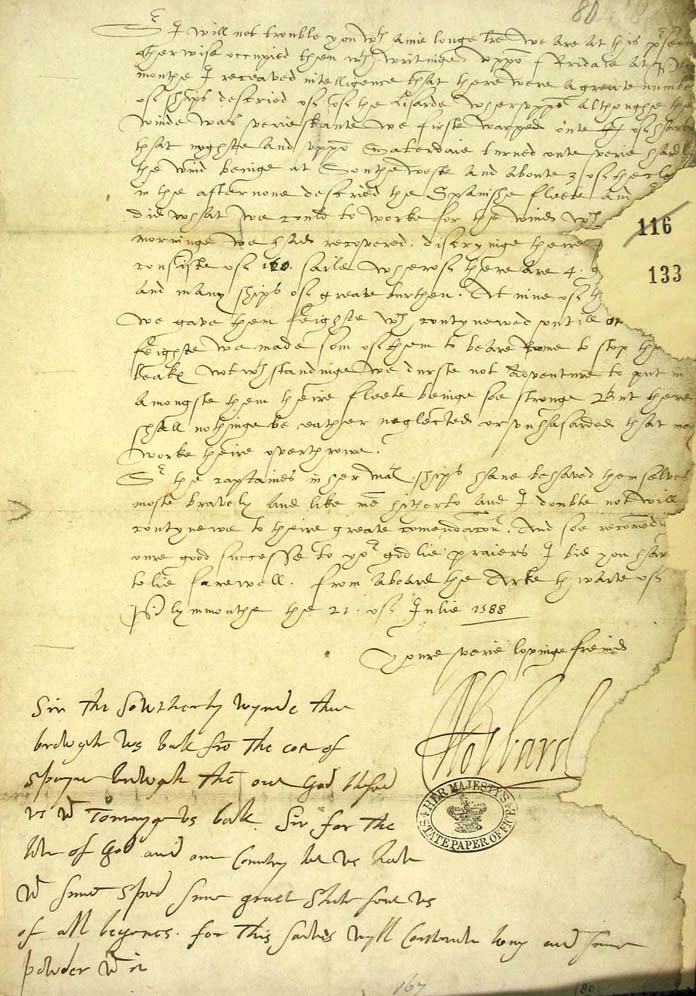
Lord Howard of Effingham, the Admiral of the English fleet, sent this report to Francis Walsingham 21 July (SP 12/212)
Transcript
S[i]r I will not trouble you w[i]th anie longe l[ett]re we are at this p[re]sent otherwise occupied then w[i]th writinge. Uppo[n] ffridaie at Ply mouthe I receaved intelligence that there were a greate number of ships descried of[f] of the Lisarde wheruppo[n] althoughe the winde was verie skante we firste warped oute of harbro that nyghte and uppo[n] Saterdaie turned oute verie hardly the winde beinge at Southe Weste and aboute 3 of the clo[ck] in the afternone descried the Spanishe fleete and [ ] did what we could to worke for the wind w[h]ich [ ] morninge we had recovered.discryinge theire f[leet?] consiste of 120 saile whereof there are 4 g[alleasses?] and many ships of greate burthen. At nine of th[e] [clock?] we gave them feighte w[hi]ch contynewed untill on[e ? ] feighte we made som of them to beare Roome to stop the[ir ?] leaks not w[i]thstandinge we durste not adventure to put in amongste them theire fleete beinge soe stronge But there shall nothinge be eather neglected or unhasarded that may worke theire overthrowe.
S[i]r the captaines in her ma[jes]t[y]s ships have behaved them selves rnoste bravely and like me[n] hitherto and I doubt not will contynewe to theire greate comendac[i]on. And soe recome[n]din[g] oure good successe to yo[u]r godlie praiers I bid you har telie farewell, from aboard the Arke thwarte of Plymmouthe the 21 of Julie 1588. youre verie lovinge friend C.Howard
Sir The Southerly wynde That brought us bak fro[m] The cost of spayne brought The[m] out God blessed us w[ith] Torny[n]g us bak. Sir for The love of God and our Country let us have w[ith] some sped some graet Shot sent us of all begnes. For This sarvis wyll Contynue long and some powder w[ith]it.
Simplified transcript
Sir, I will not trouble you with any long letter. We are otherwise occupied to be writing at present. On Friday, at Plymouth I received intelligence [news] that there were a great number of ships observed off the coast of the Lizard and, although the wind was very light, we first moved out of the harbour that night. On Saturday we hardly turned as the wind was from the South West and about 3 o’ clock in the afternoon observed the Spanish fleet and did what we could to set sail as we had recovered the wind in the morning. Describing their fleet [the Spanish] it consisted of 120 [ships] of which there were 4 galleasses and many ships of great weight. At nine o’ clock we gave them chase which continued until one, and then we permitted some of them time to plug their leaks. Notwithstanding this, we did not dare to sail amongst them as their fleet was so strong. But we neglected nothing and risked everything to try and defeat them.
Sir, the captains in her Majesty’s ships have acted so bravely and no other men before or since could be so rightly praised. And so, recommending our successes to your godly prayers, I bid you heartily farewell, from aboard the Ark, in Plymouth the 21 of July 1588. Your loving friend
C. Howard
Sir, The southerly wind that brought us back from the coast of Spain, brought them out. God blessed us by turning us back. Sir, for the love of God and our country let us have with some speed some shot [ammunition] sent to us of all sizes. For this will continue for a long time, and send some gunpowder with it
2. This is a report from Lord Howard of Effingham, the Admiral of the English fleet.
- How do you think the news that the Spanish Armada had been sighted was able to reach Lord Howard so quickly when he was at Plymouth, over a hundred miles away?
- Why do you think Howard complained to Walsingham about the wind?
- Howard says that the Spanish fleet was ‘soe strong’. What made it strong?
